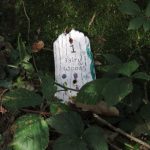Three hundred years ago,
when Russian peasants found
an unknown corpse
in the woods, or on an ice floe in the river,
they honored that person as a saint,
made up a name, a life story.
Miracles occurred.
Chapels were built.
Further back, they told tales
of an angry, all-powerful hag
who’ll kill you as soon as look at you,
or help you on your mission, depending.
A hundred years ago,
in sparse winter daylight,
a grand duchess gnaws rotted potatoes
in an unheated flat
while ancestral portraits look on.
She comes from a land of
endless pristine forests
nameless saints
angry goddesses
a knock on the door at midnight.
Those who don’t speak her language
hear her saying in her soft voice,
Lubyanka, Petropavlovska, Butyrka
and wonder, what is this lovely tongue,
those magic words?
The names of prisons.
There are other prisons.
Slava, bogatstvo, vlast’.
She takes down
the portraits in that unheated flat
—grandmother Countess G.,
great-uncle Prince S.—
sells the canvases on the black market,
chops up the frames for firewood,
reads the chronicles and the tales
by the light of the flames.
Rosalie Morales Kearns, a writer of Puerto Rican and Pennsylvania Dutch descent, is the author of the novel Kingdom of Women (Jaded Ibis, 2017) and the story collection Virgins & Tricksters, and founder of the feminist publishing house Shade Mountain Press. Her poems have appeared or are forthcoming in the Nasty Women Poets anthology, and in Luna Luna, Yes Poetry, Literary Hatchet, Bending Genres, and other journals.
Author’s note: posle nas is Russian for “after us”; slava: glory; bogatstvo: wealth; vlast’: power.
Photo by Nathan Lindahl on Unsplash
Creator Spotlight:
Rosalie Morales Kearns
Author of “Posle Nas”
What inspired you to write this poem?
For the past several years I’ve been drafting and revising a novel that starts out in Russia in the early years of the twentieth century and continues into World War II. During an earlier draft, in April 2018 I participated in a month-long poetry-writing workshop led by the awesome feminist writer Rebecca Bratten Weiss. She offered a prompt every day, and sometimes I ended up using them to write poems inspired by the characters in my novel. I think of them as my Russia poems—I have four so far. The prompt for this one was the famous quotation “After us, the deluge.” I used a shortened version, “After Us” (Posle nas in Russian), for the poem’s title.
What do you hope readers take from this poem?
I hope they get a sense for the vast sweep and deep oddness of Russian history.
To give other writers hope, would you mind sharing with us how many edits and/or submissions this poem has been through?
The first two stanzas are pretty much identical from the first draft, but the rest of it got reshuffled, reworded, and trimmed down many times. I’ve been submitting it since August of 2018, and it’s been rejected by fifteen journals. For me, that’s a very quick acceptance!
Recommend something to us! This could be a book, a short story, a video game, a project you’ve heard about, something you’re working on, etc. Anything that has you excited and that you want people to know about.
Donna Miscolta’s brilliant short story collection Living Color: Angie Rubio Stories is forthcoming this fall from Jaded Ibis Press. I was fortunate enough to read an early version of the manuscript and it really stays with me. It’s a coming-of-age story of a Mexican-American girl in California who grows up to be a writer. The book is beautifully written, hilarious at times, sad or infuriating at others, and so spot-on in its observations about the racism of lowered expectations that Black and brown children have to contend with.






